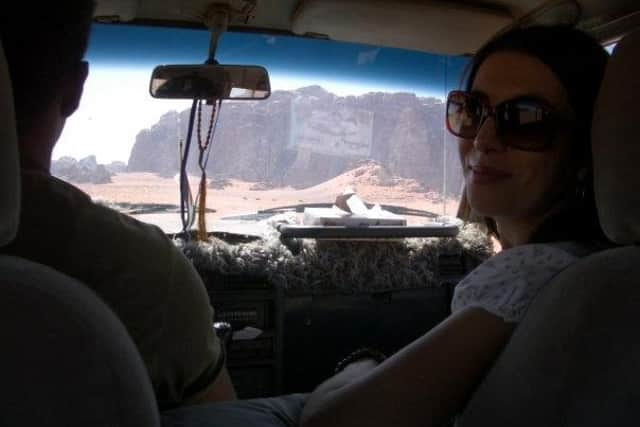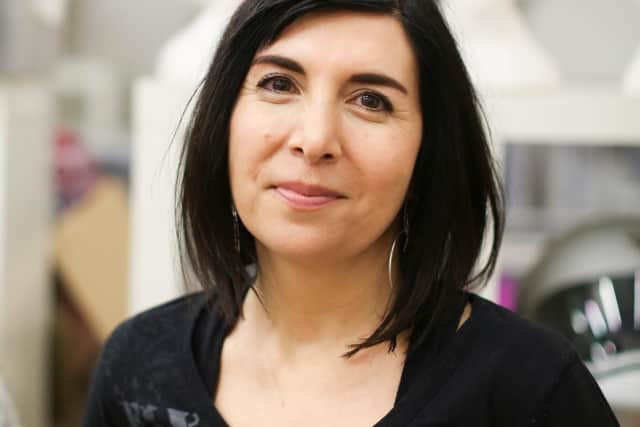Revolution Days: new play tells the real-life stories of the Arab Spring


There is a scene in Mariem Omari's new play in which an aid worker finds herself in Tunisia and is overwhelmed by the vastness of the landscape. Faced by such cinematic grandeur, she reaches for the only comparison she can think of. "This is where they filmed Star Wars," she gasps.The observation is doubly appropriate because the play's star, Raghad Chaar, has form. She appeared as a Resistance officer in Star Wars: Episode IX The Rise of Skywalker.Revolution Days, however, is concerned with a different sort of enormity, being based on Omari's experience during the Arab Spring. "It's the enormity of a moment that shapes the world," says the playwright.
Omari's work in the Middle East began in Palestine where she was employed by UNRWA, the United Nations relief and works agency. From there, she joined Médecins du Monde, a sister organisation to Médecins Sans Frontières, to help deal with the fallout of the second Gulf War in Iraq.
Advertisement
Hide AdAt around this time, word was spreading about popular uprisings in neighbouring countries. First it was Tunisia where a fruit seller had set himself on fire after his had been stock confiscated. His death in early 2011 brought people onto the streets. One by one, other countries followed suit.


Omari, who grew up in Australia and now lives in her mother's birthplace of Scotland, was quickly redeployed. Over the following months, she would find herself in Tunisia as women and children from Libya fled across the border, and in Cairo's Tahrir Square for the protest against President Mubarak. Her job was to record people's testimonies as potential evidence of human rights abuses.
She heard horrific stories: "There's never an easy way to prepare yourself for the traumatic events that come with having your house bombed, having your family killed in front of you. A lot of these people genuinely didn't believe their leaders were going to kill them. There was a real disbelief combined with fear, loss and grief of watching whole villages go up in flames."
This was distressing to hear, but Omari also saw another side. "The story I tell in the play is, yes, these people have been through harrowing experiences, but there was this humour, hope and resilience that was just astounding," she says. "Every single time I took one of those testimonies, I held on for dear life to those moments of lightness and strength."
She adds: "It's so easy to paint a picture of a victim, but these people were standing in solidarity for equality, human rights, democracy and freedom – and not one of them said, 'I shouldn't have done that.'"
Although she rarely felt in direct danger herself, she was on a heightened state of alert. "You're always moving in and out of precarious areas," she says. "We were in the middle of Tahrir Square, with guns and tear gas going off, but because it's not an actual war, you don't think you're in a dangerous situation – but people were being shot and killed."
Advertisement
Hide AdShe was slow to realise, but she was paying the price. "The impact of working in that way started to have a detrimental effect on me, physically and mentally," she says. "That's not uncommon for humanitarian workers. This burnout and secondary post-traumatic stress is not often talked about."
As early as 2013, she tried turning her experiences into a play, but was too close to the events. The trauma was too real, the emotions too raw. It has taken until now to find the necessary distance. To give her some objectivity, she rechristened her character Samira and refers to her in the third person.
Advertisement
Hide Ad"It was too soon," says Omari. "I had only just got out of the Middle East and I had what they call reintegration blues. It is pretty normal: panic attacks and unable to assimilate easily after what you have seen and done. I had to get enough distance for the play to convey messages that are ultimately hopeful."
The passage of time also allowed her to look more charitably on her younger self. In the play, staged by her own Bijli company and directed by Shilpa T Hyland, she presents Samira as a naïve idealist who believes she can change the world until she is caught short by her own vulnerability.
Has she forgiven that young woman for thinking she could save people? Omari thinks long and hard before answering.
"She did what she did for the right reasons," she says, sticking to the third person as she reflects on the influence of her Lebanese-Kurdish father. "She had her own experiences of seeing the impact of war on her own family and she wanted to do something – anything – to serve the people in her father's world. With distance and time, yes, I've forgiven her. She recognises these people aren't victims and there's so much more to what they're capable of achieving in the most difficult circumstances."
As important to Omari as the play itself is the short pre-show film, featuring interviews with people from revolution countries who now live in Scotland. Her aim is to go beyond the headlines and show what life is really like for those affected. "They discuss why they were part of that revolution, why they left and what they were hoping for," she says. "They were fighting for values they hold so dear and that we in the West take for granted."
Revolution Days is at Assembly Roxy, Edinburgh, from 23-24 November, and at Tramway, Glasgow, from 26-27 November.
A message from the Editor:
Advertisement
Hide AdThank you for reading this article. We're more reliant on your support than ever as the shift in consumer habits brought about by coronavirus impacts our advertisers.
If you haven't already, please consider supporting our trusted, fact-checked journalism by taking out a digital subscription at https://www.scotsman.com/subscriptions